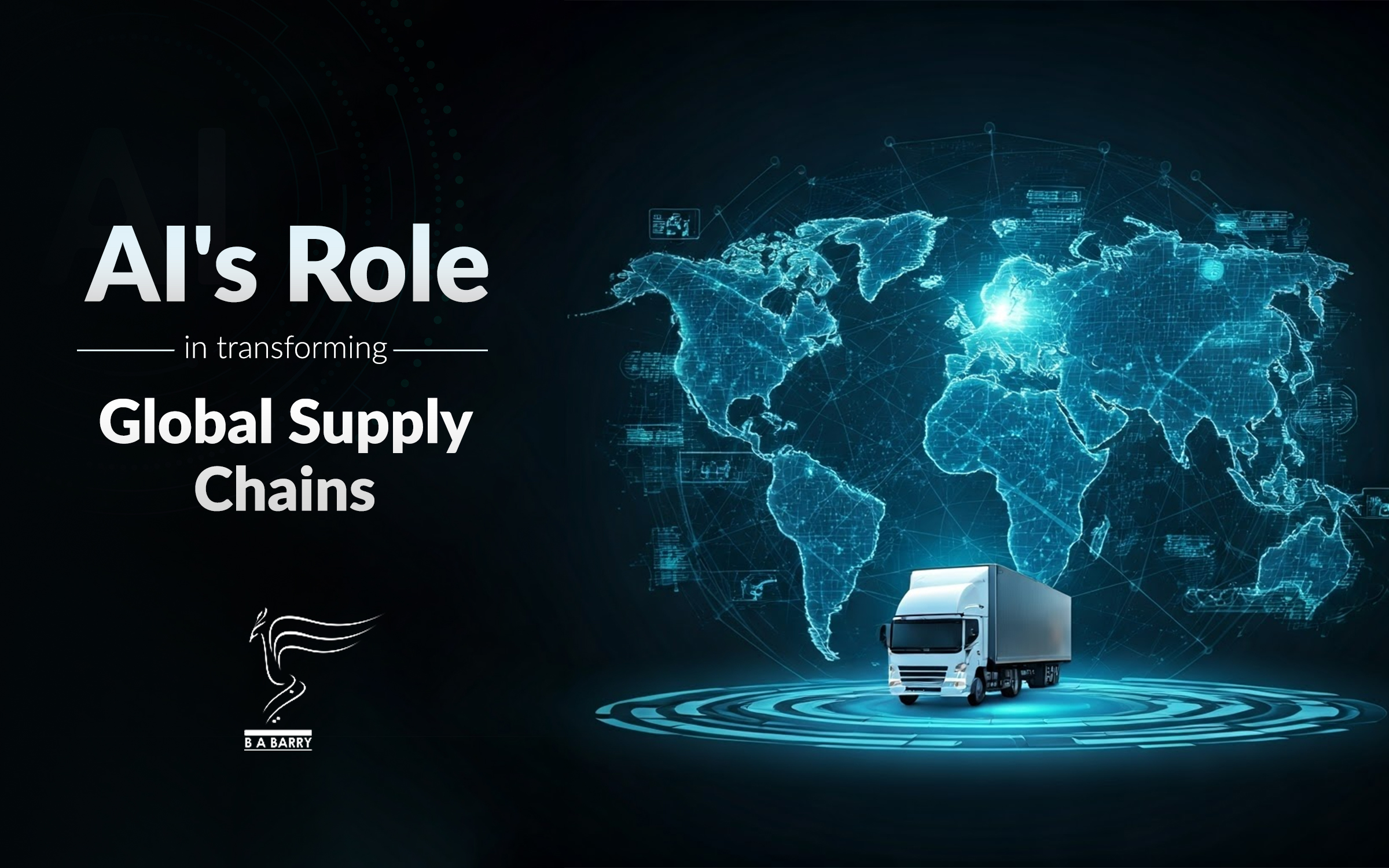- Tokyo : 09:59 |
- Singapore : 08:59 |
- Dubai : 04:59 |
- London : 00:59 |
- New York : 19:59 |
- Sydney : 11:59

As global supply chains become increasingly complex due to the increasing human population, greater customer demand, and geographical constraints, the need to develop resiliency in this area is now more than ever.
Fortunately, we have artificial intelligence (AI) on our side to help us reach new levels of efficiency and automation when it comes to supply chains.
Global supply chains are subject to changing local or international regulations, geopolitical events, climate shifts, etc. This means you need a robust system that can help you navigate these complexities to ensure supply chain stability.
According to the CEO of B A Barry Group and the founder of Geohoney, Mr. Basem Barry
“The use of AI in supply chain management has multifaceted advantages. From increasing operational efficiency to cost reduction and from improving worker safety to facilitating better decision making it can do it all.”
This article delves into the transformative role that AI is playing in creating more resilient global supply chains so keep on reading till the end to learn more.
Accurate Demand Forecasting with Predictive Analytics
AI-Powered Automation Drives Efficiency
Real-Time Data Analysis Improves Decision-Making
Better Supply Chain Risk Management
Reduced Operational Expenses
Better Inventory Management
Creates a Safer Work Environment
Faster and On-Time Deliveries
Recent studies show that about 45% of organizations are currently using AI for demand forecasting and about 43% are planning to do the same in the near future. Now businesses don’t have to rely on limited information like small sets of past sales or market data to make demand predictions.
Instead, they can use AI-powered tools that can quickly analyze very large and complex data sets to accurately give demand forecasts. These systems can also adapt to new data in real-time which allows businesses to better navigate the supply chain challenges.
With AI’s predictive analytics, seasonal adjustments, and market insights based on online customer behaviors, businesses can better handle their inventory, production, and other key operations.
AI-based supply chain automation tools are constantly generating higher efficiencies and reduced errors. Companies like FedX are using AI-based technologies to sort items based on their locations and other parameters. This leads to faster order fulfillment and better management of the high volume of e-commerce shipments.
The AI-powered automation further enhances supply chain resilience by optimizing workflows, enhancing speed, and reducing human errors.
AI gives every party in the supply chain real-time insights. It allows retailers to track inventory, warehouses to track the movement of goods, logistics providers to monitor shipment status or delivery routes, and businesses to ensure streamlined packaging and delivery.
The actionable insights given by AI in real-time make you prepared for possible future disruptions. This way you can make timely and more informed decisions to mitigate supply chain disruptions.
With the supply chains becoming more complex and widespread, the risks of disruptions also increase. However, businesses are increasingly mitigating these risks by implementing AI solutions.
With the help of AI-based simulations, businesses can run various scenarios to figure out how they should act in case of emergencies. AI can also help businesses detect fraud by rapidly analyzing large datasets and uncovering discrepancies.
Moreover, AI can also predict equipment failure or maintenance risks by analyzing past data. This helps you eliminate equipment downtime during peak production periods.
And last but not least, with the help of AI businesses can analyze supplier reliability. AI can do that by looking at market trends as well as the financial reports of the supplier.
AI can reduce operational costs by helping businesses with resource optimization. AI can figure out the right human and other resource allocations based on project needs and efficiency requirements.
AI can also help you with energy management within your business. It can further cut costs by ensuring affordable procurement. Al can analyze different suppliers or distributors to help you find a cost-effective candidate.
AI-based systems use advanced analytics to collect and process your inventory data from the past. They can use this information to accurately predict the future demand. It can look at your sales history and market trends to help you better maintain your inventory.
AI-enabled sensors or IoT devices can also perform efficient inventory tracking. These systems can also reorder, calculate delivery times, and negotiate prices which leads to timely stock replenishment and hence consistency in your supply chain.
AI further ensures streamlined supply chains by creating safer production and warehouse environments. AI-based robots can be deployed to handle tasks involving heavy machinery and chemicals which reduces injury risks.
AI coupled with IoT devices, cameras, and sensors can be used for timely hazard detection which helps you take the necessary preventive measures.
Last but not least, AI has enabled businesses to significantly reduce their delivery times. It does so by giving businesses the most optimized routes that guarantee quicker transportation of goods.
It further ensures all possible delays are identified and eliminated as soon as possible. AI-based chatbots allow businesses to engage better with customers. These bots can streamline several operations like booking, tracking, and invoices. By handling these tasks, AI gives other teams more time to quickly deliver the products and services that customers demand.
AI is expected to play a much larger role in creating smarter and more efficient global supply chains in the near future. AI-driven predictive analytics, automation, and risk management strategies allow businesses to create a more proactive supply chain management approach.
With AI-based solutions, every link of the supply chain from sourcing to manufacturing to transportation to distribution becomes more agile. This supply chain resilience driven by AI leads to optimized logistics routes, better decision-making, and robust disaster management. This gives a business a competitive advantage when it comes to navigating the intricate global supply chain challenges.
Visit B A Barry Group today to get the best eco-friendly trading, operations, and logistics solutions for your businesses worldwide.